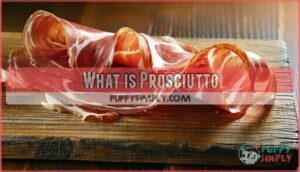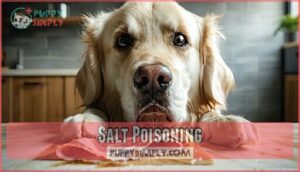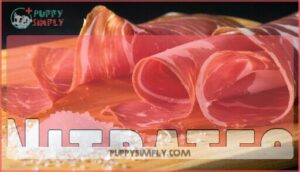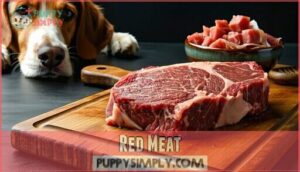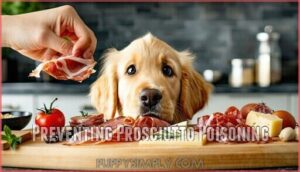This site is supported by our readers. We may earn a commission, at no cost to you, if you purchase through links.
 You shouldn’t let your dog eat prosciutto, even though those puppy-dog eyes might be hard to resist.
You shouldn’t let your dog eat prosciutto, even though those puppy-dog eyes might be hard to resist.
This Italian cured meat packs a dangerous punch with sky-high sodium levels that can cause salt poisoning in dogs.
The preservatives and nitrates used in processing make it even worse for your furry friend’s system.
A small bite won’t necessarily send you rushing to the emergency vet, but regular consumption can lead to serious health problems like kidney damage and gastrointestinal upset.
Think of prosciutto as the equivalent of feeding your dog a salt lick wrapped in bacon.
There are much safer ways to spoil your pup.
Table Of Contents
- Key Takeaways
- What is Prosciutto
- Can Dogs Eat Prosciutto
- Health Risks of Prosciutto
- Safe Alternatives for Dogs
- Symptoms of Prosciutto Poisoning
- Preventing Prosciutto Poisoning
- Frequently Asked Questions (FAQs)
- What if my dog eats prosciutto?
- Can dogs eat prosciutto if they eat nitrates?
- Can dogs eat prosciutto if they have Trichinella?
- Can you eat prosciutto on its own?
- What if my dog scarfed down a lot of prosciutto?
- Can dogs eat cured meat?
- Is it okay for dogs to eat prosciutto?
- Are prosciutto bones safe for dogs?
- Is Prosciutto Safe for Puppies?
- Are Prosciutto Treats Safe for Dogs?
- Conclusion
Key Takeaways
- Don’t give your dog prosciutto – it’s packed with dangerous levels of sodium that can cause salt poisoning, leading to vomiting, tremors, and seizures
- Watch for symptoms if your dog accidentally eats prosciutto – excessive thirst, diarrhea, difficulty breathing, and neurological signs like muscle spasms require immediate vet attention
- The high fat content can trigger pancreatitis – this Italian cured meat contains nearly 4 grams of saturated fat per ounce, plus harmful nitrates and preservatives that compound the health risks
- Choose safer protein alternatives instead – plain cooked chicken, turkey, or beef without seasoning will satisfy your pup’s cravings without the emergency vet bills
What is Prosciutto
You’ve probably seen prosciutto’s thin, silky slices gracing charcuterie boards at fancy gatherings, but this Italian delicacy is actually uncooked, dry-cured ham made from pork legs.
The meat goes through a lengthy aging process that can take anywhere from nine months to two years, during which it’s cured with salt and develops its signature rich, salty flavor.
Prosciutto Composition
Most dog owners don’t realize what’s actually in that delicate slice of prosciutto you’re enjoying. This Italian delicacy contains ingredients that can spell trouble for your furry friend.
Most pet parents have no clue that elegant prosciutto slice harbors hidden dangers for their beloved four-legged family member.
Prosciutto ingredients include these key components:
- Pork leg or thigh – the primary meat source
- High salt content – essential for the curing process
- Nitrates or nitrites – preservatives for color and shelf life
- Spices and herbs – like garlic, pepper, or rosemary for flavor profile
Similarly, chorizo contains garlic, which is also harmful to dogs.
Prosciutto Processing
Understanding prosciutto’s composition leads us to how it’s actually made.
Traditional recipes involve curing methods that pack pork legs with salt, then aging process that spans months or years.
This meat processing creates concentrated salt content through controlled drying.
Quality control guarantees proper curing, but these very techniques that make prosciutto delicious also make it dangerous for your dog.
Nutritional Content
Looking at prosciutto nutrition reveals why it’s problematic for your pup.
A single ounce packs 55 calories with concerning fat composition – nearly 4 grams of saturated fat.
The protein quality seems impressive at 7 grams, but mineral density tells a different story.
With 520mg sodium per ounce, this vitamin profile rich in B vitamins can’t offset the calorie breakdown that spells trouble for dog nutrition.
Can Dogs Eat Prosciutto
Now you’re probably wondering: can your dog eat prosciutto? The short answer is no.
While a tiny piece won’t likely cause immediate harm, prosciutto isn’t safe for dogs. This isn’t about cooking prosciutto differently—it’s already cured and loaded with problems.
Even safe portions don’t exist because of breed sensitivity and the toxic foods for dogs category it falls into. Unlike alternative snacks that benefit dog health, prosciutto for dogs creates unnecessary risks.
Skip the prosciutto dangers entirely.
Health Risks of Prosciutto
While prosciutto might seem like a tasty treat to share with your dog, this Italian delicacy poses serious health risks that can harm your furry friend.
The combination of high salt content, excessive fat, toxic spices, and chemical preservatives makes prosciutto dangerous for dogs and can lead to poisoning or other severe complications.
Fat Content
Prosciutto’s fat content creates serious health problems for your furry friend.
This Italian delicacy packs excessive calories that can wreak havoc on your dog’s digestive system and overall well-being.
Here are five major concerns about prosciutto’s fat content in your dog diet:
- Pancreatitis risk – High fat triggers dangerous pancreatic inflammation
- Obesity concerns – Excess calories lead to unhealthy weight gain
- Digestive issues – Rich fats cause stomach upset and diarrhea
- Vitamin depletion – Fat interferes with nutrient absorption
- High calories burden your dog’s metabolism unnecessarily
Salt Poisoning
High sodium levels in prosciutto can trigger salt poisoning in your dog.
When dogs consume excessive sodium, their cells release water to restore balance, causing cellular damage.
This water imbalance affects brain function, leading to sodium toxicity symptoms like vomiting, tremors, and seizures.
Fatal consumption levels require immediate treatment options, including IV fluids to gradually correct sodium toxicity.
Spices
Flavor enhancers in prosciutto create a spice minefield for your dog.
Black pepper, garlic, and Mediterranean herbs like oregano transform this cured meat into toxic foods for dogs.
These spices can trigger allergic reactions and stomach upset.
Unlike safe seasonings for homemade treats, prosciutto’s spice blend makes it doubly unhealthy.
Skip the risky spice alternatives entirely.
Nitrates
Most commercial prosciutto contains nitrates and nitrites as preservatives, creating another layer of concern for your dog’s health.
These chemicals can trigger nitrate toxicity in pets, especially smaller breeds who reach unsafe limits faster.
While nitrate sources vary across cured meats, prosciutto’s high nitrate levels combined with excessive sodium create a dangerous cocktail that’s simply not worth the risk.
Consider that high sodium content in deli meats can also lead to sodium poisoning in dogs.
Safe Alternatives for Dogs
You don’t need to give up treating your dog just because prosciutto’s off the menu.
There are plenty of safe alternatives that’ll make your pup’s tail wag without putting their health at risk.
Poultry
Instead of reaching for that salty prosciutto, consider poultry as your go-to protein source for dog treats. Skinless chicken or turkey provides excellent poultry nutrition without harmful additives found in processed meats.
You can find poultry-based dog treats online.
When preparing safe food for dogs, follow these cooking methods:
- Remove all bones before serving to prevent choking hazards
- Cook thoroughly without seasoning or toxic foods for dogs like garlic
- Cut into small, manageable pieces for easy digestion
- Start with small portions to check for allergy concerns
- Practice safe handling by washing hands and surfaces after preparation
Red Meat
Beyond poultry, red meat offers excellent protein sources for your dog.
Beef, lamb, and venison provide essential nutrients when cooked thoroughly without seasoning.
Unlike unhealthy prosciutto, these safe meat options support muscle development.
Cook red meat completely to eliminate harmful bacteria, remove bones, and serve appropriate portions.
Beef provides great protein and can be a beneficial addition to your dog’s diet.
These alternatives give your pup the protein benefits without pork’s processed dangers.
Meat-Free Treats
Variety becomes your best friend when exploring nutritional benefits beyond traditional dog food.
Fresh fruits and vegetables offer treat variety without the risks of harmful dog food ingredients.
These options support canine health while addressing allergy concerns that processed meats create.
- Sweet potatoes and carrots provide beta-carotene for eye health and immune support
- Green beans and broccoli deliver fiber for digestive wellness and weight management
- Apples and blueberries offer antioxidants that boost canine nutrition naturally
Homemade recipes let you control ingredients completely.
Many owners are now opting for plant-based dog treats as a healthy alternative.
Start with portion control – small pieces prevent choking and maintain balanced nutrition.
These safe food for dogs alternatives satisfy your pup’s cravings without prosciutto’s dangers.
Symptoms of Prosciutto Poisoning
If your dog has eaten prosciutto, you’ll need to watch for warning signs that indicate poisoning has occurred.
The symptoms can range from mild stomach upset to serious neurological problems, depending on how much your pup consumed and their individual sensitivity to salt and additives.
Sodium Poisoning
Salt poisoning strikes when your dog’s sodium levels spike beyond safe limits after eating prosciutto.
You’ll notice excessive thirst, vomiting, and diarrhea as early warning signs.
Sodium toxicity in dogs creates dangerous electrolyte imbalance, potentially causing kidney damage and neurological effects.
Even small amounts of pepperoni can cause gastroenteritis in dogs.
Water deprivation compounds the problem, making salt toxicity a serious emergency requiring immediate veterinary attention.
Gastrointestinal Distress
When your dog’s digestive system encounters prosciutto’s high fat content, it triggers gastrointestinal distress that’s hard to ignore.
You’ll notice stomach irritation leading to vomiting and diarrhea within hours.
Digestive issues include appetite loss and abdominal pain as their system struggles processing the rich meat.
These bowel changes signal their digestion can’t handle prosciutto’s intensity, leading to abdominal pain as a clear sign of distress.
Neurological Symptoms
While stomach problems grab your attention first, prosciutto’s high sodium content can trigger serious neurological symptoms in dogs.
Excessive salt causes brain cell damage as cells release water to balance sodium levels.
You’ll notice seizures and tremors, muscle spasms, loss of energy, and difficulty breathing.
These neurological signs indicate severe sodium poisoning requiring immediate veterinary intervention.
Preventing Prosciutto Poisoning
You can protect your dog from prosciutto poisoning by keeping all cured meats out of reach and educating family members about the dangers.
The best prevention involves choosing safer protein alternatives and maintaining fresh water access at all times.
Monitoring Salt Intake
Keeping track of your dog’s sodium levels helps prevent salt poisoning from prosciutto and other salty foods.
Most dogs need less than 100mg of sodium daily, but prosciutto contains 620mg per small serving.
Check food labels regularly and maintain your pet’s water balance to support proper kidney function.
Salt sensitivity varies between dogs, so follow dietary guidelines carefully to prevent salt poisoning and ensure your dog’s overall health, considering the importance of sodium levels.
Avoiding Processed Meats
Beyond watching your dog’s salt intake, you’ll want to steer clear of all processed meats like prosciutto.
These products pack harmful nitrates, nitrites, and excessive sodium that can poison your pet.
Instead, focus on healthier dog treats and homemade dog food options.
Reading food labels helps you spot dangerous additives.
Natural dog nutrition means minimizing additives altogether for your furry friend’s safety.
Providing Fresh Water
If your dog sneaks prosciutto, immediate water access becomes critical.
Salt triggers intense thirst, and you’ll need to monitor their water intake carefully. Watch for dehydration signs like excessive panting or lethargy.
Don’t restrict water availability, but offer small amounts frequently to maintain electrolyte balance. Many owners find a self-filling water bowl helpful in these situations.
Post-prosciutto thirst means their body’s fighting sodium overload naturally, and it’s essential to ensure they have access to water at all times to combat dehydration.
Seeking Veterinary Guidance
Your veterinarian’s expertise becomes invaluable when prosciutto incidents occur.
Know when to call immediately—emergency signs include vomiting, tremors, or difficulty breathing.
While vet costs vary, don’t delay seeking help.
Follow-up care guarantees your dog’s recovery, and online vet consultation can provide initial guidance.
Sometimes a specialist is needed for severe cases, but your regular veterinarian handles most pet nutrition concerns effectively.
Your veterinarian’s role is crucial in ensuring your dog receives the necessary care to recover from such incidents, making regular veterinarian visits important for follow-up care.
Frequently Asked Questions (FAQs)
What if my dog eats prosciutto?
Like a sailor thrown overboard, you’ll need to act quickly.
Provide fresh water immediately, watch for vomiting or excessive thirst, and call your vet if symptoms appear or large amounts were consumed.
Can dogs eat prosciutto if they eat nitrates?
No, dogs shouldn’t eat prosciutto regardless of nitrate content. The high salt levels alone can cause sodium poisoning, leading to vomiting, diarrhea, and dehydration. Nitrates worsen these risks substantially.
Can dogs eat prosciutto if they have Trichinella?
Walking through this health minefield requires caution.
If your dog has Trichinella, don’t give them prosciutto.
The parasite weakens their system, making the high salt, fat, and additives even more dangerous for their compromised health.
Can you eat prosciutto on its own?
You can absolutely eat prosciutto on its own.
Many people enjoy thin slices as an appetizer or snack.
The rich, salty flavor makes it perfect for savoring solo without crackers or cheese, with the rich flavor being a key aspect of its enjoyment.
What if my dog scarfed down a lot of prosciutto?
Panic’s probably setting in, but don’t delay—contact your vet immediately.
Large amounts can cause dangerous salt poisoning with symptoms like vomiting, tremors, and seizures.
Time’s critical here, so act fast.
Can dogs eat cured meat?
Cured meats aren’t safe for your pup.
They’re packed with salt, nitrates, and spices that can cause serious health problems.
Skip the charcuterie board sharing and stick to dog-friendly treats instead.
Is it okay for dogs to eat prosciutto?
No, you shouldn’t give your dog prosciutto. It’s loaded with salt, fat, and harmful additives like nitrates that can cause salt poisoning, pancreatitis, and digestive upset in dogs.
Are prosciutto bones safe for dogs?
No, prosciutto bones aren’t safe for dogs.
They’re processed with high salt levels and preservatives that can cause sodium poisoning.
Cooked bones also splinter easily, creating choking hazards and potential intestinal damage.
Is Prosciutto Safe for Puppies?
Like walking through a minefield, feeding prosciutto to puppies is especially dangerous.
Their developing systems can’t handle the high salt, fat, and additives.
Skip it entirely—your puppy’s health isn’t worth the risk.
Are Prosciutto Treats Safe for Dogs?
Most commercial prosciutto treats aren’t safe for your dog.
They’re packed with salt, nitrates, and harmful spices like garlic.
Instead, choose treats specifically made for dogs or offer plain, cooked lean meats.
Conclusion
Veterinary emergency clinics report that sodium toxicity affects thousands of dogs annually, with processed meats being a leading cause.
Now you know the answer to "can dogs eat prosciutto" – it’s a definitive no.
The high salt content, preservatives, and nitrates create a perfect storm for canine health problems.
Instead of sharing your charcuterie board, stick to dog-approved treats that’ll keep your furry friend’s tail wagging without the emergency vet bills.
- https://www.merckvetmanual.com/toxicology/nitrate-and-nitrite-poisoning/nitrate-and-nitrite-poisoning-in-animals
- https://www.preventivevet.com/dogs/herbs-spices-for-dogs
- https://www.petpoisonhelpline.com/pet-tips/sodium-toxicity-symptoms-in-pets/
- https://www.hillspet.com/dog-care/nutrition-feeding/risks-of-excessive-salt-intake-for-dogs
- https://www.akc.org/expert-advice/nutrition/can-dogs-eat-ham/

